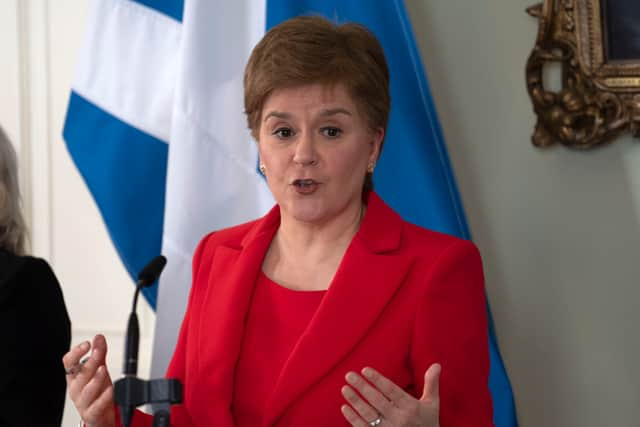Scottish independence: what did Nicola Sturgeon say about new economic case paper - what was in the document?
and live on Freeview channel 276
Nicola Sturgeon has put forward the economic argument for Scotland leaving the union in a newly released paper.
‘Building a New Scotland’ has set out key issues for a prosepctive independent move such as currency, membership of the European Union and the energy market. It comes as the Scottish government battles it out with the UK government in the Supreme Court for the right to hold a legally-binding vote in October next year.
Advertisement
Hide AdAdvertisement
Hide AdHere’s the key points fro the paper and what the reaction to it has been.


What are the key points from ‘Building a New Scotland’?
Currency
The question over which currency Scotland will use in the stuation it becomes an independent country has been debated on since before the 2014 referendum. The new paper set out the SNP’s plan for currency post-independence.
Sturgeon said that Scotland would continue to use the British pound for a period of time after gaining independence. The country would then move to a Scottish version of the pound “as soon as possible”.
Moving to the Scottish currency will only happen once a series of situations and “tests” are met. The First Minister said: “One of the criteria for the exact time at which that move is made would be the overall economic conditions and, therefore, if you tie yourself into a specific timescale, you could end up trying to do it at a time that would not be optimal.”
Advertisement
Hide AdAdvertisement
Hide AdAdditionally, a Scottish central bank would be set up, with the process beginning immediately after the country becomes independent. Sturgeon said:“Fiscal sustainability is not about an overnight balancing of the budget for any country.
“It is assessed by the institutions that we’ve spoken about here: a central bank, the beefed up Scottish Fiscal Commission; assessed by them that we are on a medium path to fiscal sustainability both in terms of deficit and the path of debt and these would be judgements that would be informed for Parliament who would take this decision.”
EU membership
Sturgeon also said that Scotland would seek to apply to re-join the European Union (EU) as soon as possible. However, the timeline of this may rely on the timeline of the currency situation set out above - this is because membership is not possible until the country is under control of its own monetary policy and currency.
The First Minister added that Scotland would not seek to join the Euro currency, as it “would not qualify” to use this. However, she said: “Independence opens the door to Scotland rejoining the EU and the single market.”
Energy industry
Advertisement
Hide AdAdvertisement
Hide AdThe SNP leader said that as an independent country, Scotland would seek to move away from fossil fuels “as quickly as possible”. One of the most contentious points during the 2014 campaign was the oil reserves in the North Sea.
However, the country would look to move away from this as a key to Scotland’s energy industry, instead looking toward using more renewable sources. Sturgeon said: “Oil and gas is a declining asset and our obligation to the planet means that we must move away from fossil fuels as quickly as possible. If we invest remaining oil revenues and use remaining borrowing powers responsibly and for a purpose, we can invest up to £20bn in the first decade of independence.”
It was also argued within the new paper that this turn to renewable energy will help to bolster Scotland’s economy.
What has been the reaction to the ‘Building a New Scotland’ paper?
The Institute for Fiscal Studies (IFS) has argued that Scotland would need to increase taxes or cut public spending to facilitate the move to renewable energy. Otherwise, the country would need to seek to borrow for the fund or face a “substantial deficit” after independence.
Advertisement
Hide AdAdvertisement
Hide AdThis point has been criticised by the Scottish Tories, with leader Douglas Ross saying: “It’s completely the wrong priority at the worst possible time for Scotland. Nicola Sturgeon should be using Government resources to help struggling families instead of to push for another divisive and unwanted referendum.”
Other union-supporting Scottish parties, including the Liberal Democrats and Labour, also criticised the plan. Scottish Labour finance spokesman Daniel Johnson said the paper had “no answers to the key economic questions” of independence, while Scottish Lib Dem leader Alex Cole-Hamilton said the plan was “a dangerous recipe for years of chaos”.
Downing Street has also commented on the paper. The Prime Minister’s official spokesman said: “People in Scotland want their governments to be focused on the issues that matter to them, things like energy security, the cost of living and obviously supporting Ukraine in their war against Russia.
“So the Prime Minister remains of the view it is not the time to be talking about another independence referendum.”
Comment Guidelines
National World encourages reader discussion on our stories. User feedback, insights and back-and-forth exchanges add a rich layer of context to reporting. Please review our Community Guidelines before commenting.
